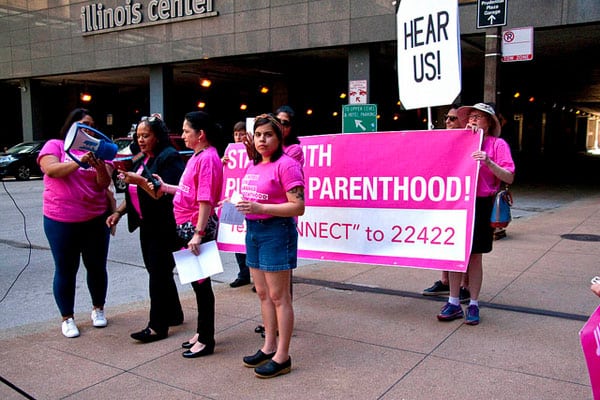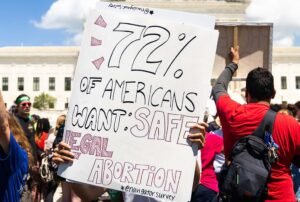
September 7, 2018; New York Times
As pro-choice people across the country watch the Supreme Court hearings for Brett Kavanaugh with bated breath, knowing that the fate of abortion rights may rest with his vote, states continue to make headway in limiting abortion access without his help.
Eventually, it will be the courts that determine whether these state laws that “chip away” at access to abortion and contraception options are constitutional, but in the interim, abortion providers are caught in a situation where they must turn down people seeking their help, often having to send them to other states or hundreds of miles away. For many, especially low-income women and women of color, neither of these are viable options. And while states have chosen different tactics and approaches to limit abortion options, Arkansas may serve as an exemplar for what will happen across the nation.
Arkansas’s fight mainly centers on medication abortions. This technique enables those up to 10 weeks pregnant to take two pills—the first supervised by a doctor and the second at home—in order to terminate a pregnancy without surgery. The process was approved as safe for use in 2000. When the state of Arkansas banned this practice, it left only one clinic operating in a state of three million. (There are currently three.) Women in northwest Arkansas, for example, where the clinic only provided medication abortions, were left with two options: travel to another state, or go 380 miles round trip to Little Rock for a surgical abortion.
A court has issued a stay in this case. The three remaining clinics are currently operating again, but other barriers remain in place: a ban on abortions after 20 weeks, a 48-hour waiting period that makes necessary two or three trips to the clinic; required parental consent for minors; and a prohibition on doctors dispensing medication abortion pills remotely by video.
Many legal experts say the more likely outcome of the change on the court, at least in the near term, will be less sweeping: States like Arkansas will get their way with smaller cases that reduce—but not eliminate—the right to an abortion.
“The Arkansas case is a bellwether, not because it’s a frontal assault on Roe, but because it’s another nudge in the direction of ever more restrictions on the right that Roe recognized,” said Stephen I. Vladeck, a professor at the University of Texas School of Law in Austin. “It now becomes a much bigger story because we have this fundamental shift in the center of gravity.”
Arkansas is in the heart of a broad band through the country’s middle and south where abortion access in most states is already down to a few clinics. This map formed gradually, abortion rights advocates say, as red states passed laws that tested the boundaries of abortion restrictions, and federal appeals courts—in particular in the Eighth and Fifth Circuits—upheld them.
Sign up for our free newsletters
Subscribe to NPQ's newsletters to have our top stories delivered directly to your inbox.
By signing up, you agree to our privacy policy and terms of use, and to receive messages from NPQ and our partners.
Paying attention to what is happening in states like Arkansas and to the appointments to the district and circuit courts that serve these states becomes important for those concerned about these issues. The state leadership in Arkansas changed from Democratic to Republican in 2012, which brought a clear shift in how laws restricting abortion were passed.
The state has passed 29 laws restricting abortion since 2011, the third most in the country after Kansas and Indiana, said Elizabeth Nash, a senior policy analyst for the Guttmacher Institute. Across the country, state legislatures have passed 423 abortion restrictions since Republicans swept statehouses in 2010, Ms. Nash said. That is about 35 percent of all abortion legislation that has passed since 1973.
Some of these laws wound up in court, where they have increasingly received a more sympathetic hearing as some federal appeals courts have grown more conservative.
“The noose is tightening,” said Bettina E. Brownstein, a lawyer in Little Rock who represents abortion clinics. “The courts are not the avenue they once were. That’s the big difference.”
Today, Republican presidents have appointed 10 of the 11 judges on the Eighth Circuit, compared to six in 2001, according to Russell Wheeler, a visiting fellow at the Brookings Institution in Washington.
If the lower courts rule against the clinics, Arkansas will again be left with one clinic for the entire state—one that can only perform surgical abortions. The rest of the state will be an “abortion desert,” along with six other states (North Dakota, South Dakota, Wyoming, Kentucky, Mississippi, and West Virginia), making access to abortion even more difficult, depending on where one lives.
It is most likely that if the lower court does not rule in favor of the clinics, this case will go to a newly constituted Supreme Court, and the standards that could come from that Court might not be what the clinics and those it serves would hope for. Perhaps NPQ will one day be writing about the growing role of nonprofits in providing access to states where a full range of abortion options are still available.—Carole Levine













